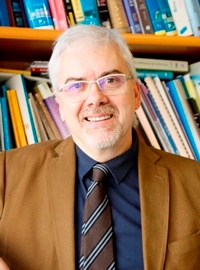Javier Cudeiro Mazaira

Javier Cudeiro is a Medicine and Surgery Doctor by Universidad de Santiago de Compostela (1987), Neurophysiology Specialist by London University (1992), Physiology and Sleep Medicine Master's Degree by Universidad Pablo de Olavide (2007) and Physiology Professor in Universidade da Coruña since 1999.
His professional career has its development in Germany (Physics Department of Marburg University, 1988), in England (Oftalmology Institute of London University, 1990-92), USA (Harvard University and Massachusetts Institute of Technology, 2013-2014) and Spain (Universidad Santiago de Compostela and Universidade da Coruña)
He was a visiting professor in Manchester University-UMIST, Fellow of University College of London, Visiting Scientist within Neurology Department of Harvard University and he is Affiliated Member of Berenson-Allen Center and also of Beth Israel Deaconess Medical Center in Boston.
He was Vicepresident of Sociedad Española de Neurociencia and President of Sociedad Española de Ciencias Fisiológicas (Sociedad he directed from 2009 to 2016). He is a member of European Dana Alliance for the Brain, ex-vocal of Communication Committee of the Federation of European Neuroscience Society and Academic from election of the Real Academia de Medicina y Cirugía de Galicia.
He received National Prize of Investigation from Fundación APMIB 2001, Infanta Cristina-Imserso Second Prize in 2004 (I+D+i) and Second Prize of Federación Española de Parkinson in 2009.
Currently he is Elected President of Sociedad Española de Neurociencia, he coordinates NEUROcom Group and he directs Centro de Estimulación Cerebral de Galicia.
Scientific Interests
Currently his scientific interest is double. On one hand he is involved in a basic investigation line focused on the study of visual processing, working memory and feedback circuits. On the other hand his interest is related to motor control in humans, its alterations in Parkinson Disease (PD) and multiple rehabilitation strategies such as sensorial stimulation, virtual reality and non-invasive neuromodulation tecniques (TMS, tDCS, SMF). The results obtained by his group showed for the first time that nitric oxide (NO) plays a key role in the vision, controlling the transfer of information from the thalamo to the cortex. Furthermore, the laboratory was pioneer in proving that NO also plays a fundamental role in the homeostatic control in sleep and during awaken. In NEUROcom, feedback mechanisms established among different levels of processing of the visual system are studied, essentially V1 and lateral geniculate nucleus together with prefrontal cortex.
NEUROcom was the first lab in Spain using neuromodulation techniques (TMS and static magnetic fields) in order to study the cortical-thalamic loop in the visual system both in awake primates as in anaesthetised animals. In the other line of investigation, human motor control, NEUROcom showed that PD pacients depend critically on sensorial-stimulus (auditory and visual) for executing efficiently the more altered movements they have, like the march. PD pacients can generate a march pattern less pathological in presence of the adecuate sensorial stimulation, even reaching a reduction in motor blocks.
This discovery lead NEUROcom lab to register a patent a sensorial stimulation system which allows PD pacients conduct a more functional march and the use of non invasive neuromodulation techniques and virtual reality as tools in neurorehabilitation of PD patients, which lead to other patent. Currently, NEUROcom is focused on the study of central mechanisms of fatigue and its neuromodulation with non-invasive tecniques, and at the same time they have developed an investigation in order to evaluate the effect of these tecniques in addictive behaviors.
From a clinic point of view, Cudeiro carries out an assistance work within Centro de Estimulación Cerebral de Galicia where he uses non-invasive techniques for the treatment of some neuro-psychiatric diseases.